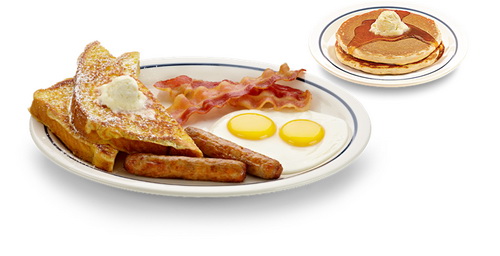breakfast
break·fast [breakfast breakfasts breakfasted breakfasting] noun, verb [ˈbrekfəst] [ˈbrekfəst]
noun countable, uncountable
the first meal of the day
• a big/hearty/light breakfast
• (especially BrE) a cooked breakfast
• Do you want bacon and eggs for breakfast?
• They were having breakfast when I arrived.
• She doesn't eat much breakfast.
see also bed and breakfast, continental breakfast, English breakfast, power breakfast, wedding breakfast, see a dog's breakfast/dinner at dog n.
Word Origin:
late Middle English: from the verb break + the verb fast.
Culture:
meals
Americans and British people generally eat three meals a day though the names vary according to people’s lifestyles and where they live.
The first meal of the day is breakfast. The traditional full English breakfast served in many British hotels may include fruit juice, cereal, bacon and eggs, often with sausages and tomatoes, toast and marmalade, and tea or coffee. Few people have time to prepare a cooked breakfast at home and most have only cereal and/or toast with tea or coffee. Others buy coffee and a pastry on their way to work.
The traditional American breakfast includes eggs, some kind of meat and toast. Eggs may be fried, ‘over easy’, ‘over hard’ or ‘sunny side up’, or boiled, poached or in an omelette (= beaten together and fried). The meat may be bacon or sausage. People who do not have time for a large meal have toast or cereal and coffee. It is common for Americans to eat breakfast in a restaurant. On Saturday and Sunday many people eat brunch late in the morning. This consists of both breakfast and lunch dishes, including pancakes and waffles (= types of cooked batter) that are eaten with butter and maple syrup.
Lunch, which is eaten any time after midday, is the main meal of the day for some British people, though people out at work may have only sandwiches. Some people also refer to the midday meal as dinner. Most workers are allowed about an hour off work for it, called the lunch hour, and many also go shopping. Many schools offer a cooked lunch (school lunch or school dinner), though some students take a packed lunch of sandwiches, fruit, etc. Sunday lunch is special and is, for many families, the biggest meal of the week, consisting traditionally of roast meat and vegetables and a sweet course. In the US lunch is usually a quick meal, eaten around midday. Many workers have a half-hour break for lunch, and buy a sandwich from near their place of work. Business people may sometimes eat a larger lunch and use the time to discuss business.
The main meal of the day for most people is the evening meal, called supper, tea or dinner. It is usually a cooked meal with meat or fish or a salad, followed by a sweet course. In Britain younger children may have tea when they get home from school. Tea, meaning a main meal for adults, is the word used in some parts of Britain especially when the evening meal is eaten early. Dinner sounds more formal than supper, and guests generally receive invitations to ‘dinner’ rather than to ‘supper’. In the US the evening meal is called dinner and is usually eaten around 6 or 6.30 p.m. In many families, both in Britain and in the US, family members eat at different times and rarely sit down at the table together.
Many people also eat snacks between meals. Most have tea or coffee at mid-morning, often called coffee time or the coffee break. In Britain in the past this was sometimes also called elevenses. In the afternoon many British people have a tea break. Some hotels serve afternoon tea which consists of tea or coffee and a choice of sandwiches and cakes. When on holiday/vacation people sometimes have a cream tea of scones, jam and cream. In addition many people eat chocolate bars, biscuits (AmE cookies) or crisps (AmE chips). Some British people have a snack, sometimes called supper, consisting of a milk drink and a biscuit before they go to bed. In the US children often have milk and cookies after school.
Example Bank:
• He treated his wife to breakfast in bed on her birthday.
• Low-fat cheeses and yogurt are good breakfast foods.
• Would you clear away the breakfast things?
• a full English breakfast of cereal, bacon and eggs and toast
• Do you want bacon and eggs for breakfast?
• I always have a cooked breakfast.
• I'm going to have a nice leisurely breakfast tomorrow.
• She doesn't eat much breakfast.
• The price per person includes a full English breakfast.
verb intransitive ~ (on sth) (formal)
to eat breakfast
Word Origin:
late Middle English: from the verb break + the verb fast.
Example Bank:
• Many of the hotel's guests had already breakfasted and departed.
• They breakfasted on coffee and hot rolls.
